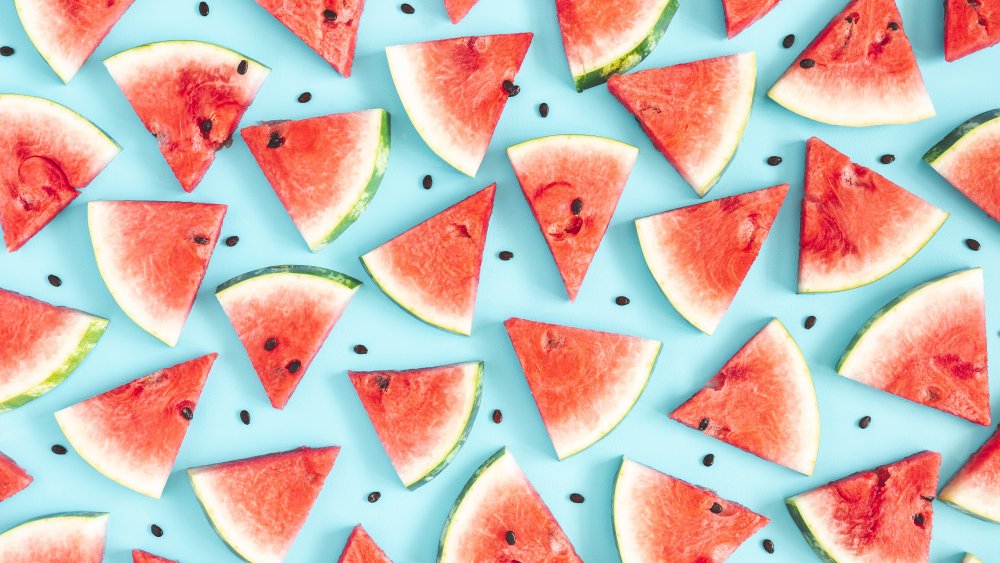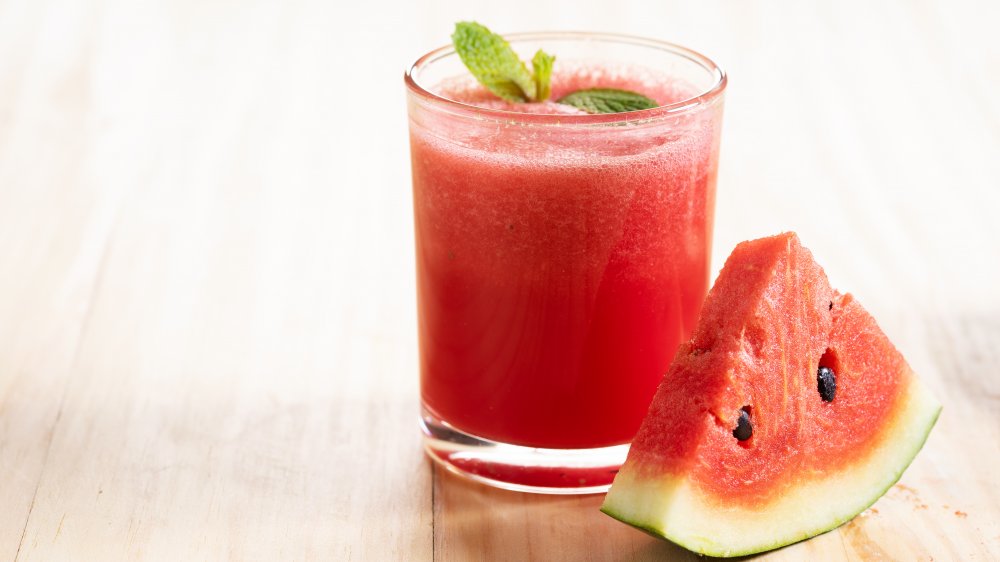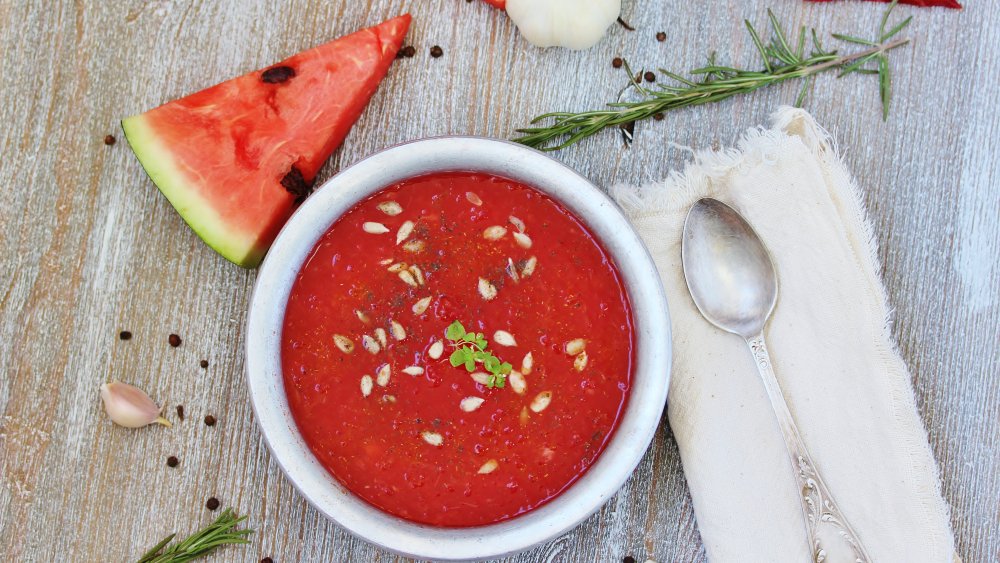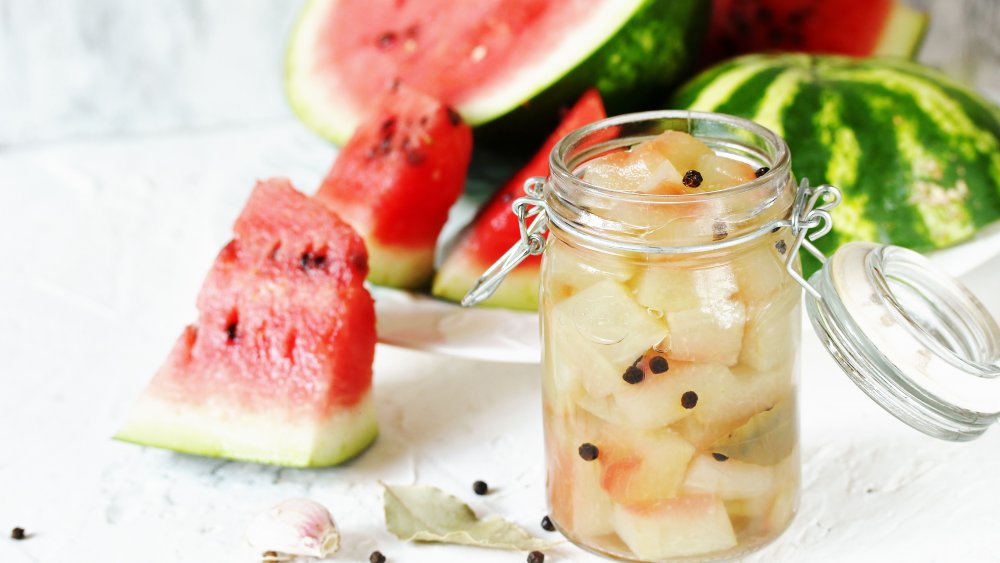Here's Why You Should Start Eating More Watermelon
Nothing screams summer like a big red juicy slice of watermelon. Its very mention almost inspires relaxation. Resplendent in thoughts of picnics, sunbathing, and backyard barbecues, watermelons are a signal to slow down and enjoy family gatherings. Mark Twain wrote of the watermelon (via Good Reads), "It is chief of this world's luxuries, king by grace of God over all the fruits of the earth." We couldn't agree more. Watermelon not only conjures up good vibes, but it is also oozing with incredible nutritional and health benefits. If you aren't snacking on this superfood, especially during the summer months when it is in peak season and at its sweetest, you might want to reconsider.
Watermelon counts squash, cucumbers, and cantaloupe among its family members, or as we might say on Jeopardy, things that grow on vines on the ground. This fruit hails from Africa where Egyptians feasted on it over 5,000 years ago. Today, there are 1,200 varieties of watermelon, with the U.S. and Mexico growing between 200 and 300 different kinds of this fruit. The most popular kinds of watermelon are seeded, seedless, mini, yellow, and orange flesh. But one of the many things that make this fruit so incredible is its composition. The watermelon is comprised of 92 percent water, contains only 46 calories per cup, and has zero fat (via Food Network). But that's just where all the goodness of watermelons begins. This fruit is so rich in antioxidants, you are going to want to eat more of it.
Watermelon helps with hydration
Watermelon is full of health benefits. Because watermelon is mostly water, it can play an important role in keeping you hydrated. We know that proper hydration keeps the wheels running, as it helps to regulate our body temperature, cushions joints, and moves waste out of our bodies. At least 20 percent of our water intake actually comes from the food we consume (via Mayo Clinic). Eating watermelon not only keeps you hydrated, but that high water content also helps your body feel full (via Healthline). It can also help alleviate morning sickness in pregnant women by restoring lost hydration, while at the same time serving as a natural aid for easing heartburn and reducing swelling (via Parents).
And, according to a study published in the Journal of Agricultural Food and Chemistry, if you drink watermelon juice — which is just watermelon that has been put in a blender — before a strenuous workout, it can help reduce your heart rate and aid in recovery by relieving muscle soreness the following day. This is largely due to the fact watermelon is full of the amino acid L-citrulline. L-citrulline converts to L-arginine, another amino acid that aids in improving circulation (via National Geographic). These benefits only scratch the surface of all the powerhouse nutrients that watermelon contains. There are so many more.
Watermelon is a lycopene heavyweight
Watermelon is also an incredible source of two powerful antioxidants: beta-carotene and lycopene. Lycopene has long been touted for the role it places in lowering the risk of cardiovascular disease and cancer. Tomatoes generally take center stage when we talk about lycopene, but one cup of watermelon actually contains the same amount of lycopene as two medium tomatoes. And while tomatoes need to be cooked to realize the optimal amount of this rich antioxidant, in watermelon, it does not, making it easily accessible to consume (via Parents). Lycopene may help in keeping your eyes healthy, warding off macular degeneration.
In addition to these antioxidants, watermelon contains large amounts of vitamins C and A. These two vitamins play a critical role in the health of your hair and skin. And who doesn't want good hair and skin? Vitamin C is needed for your body to make collagen. Collagen is an essential protein for keeping your hair strong and your skin smooth and soft. Vitamin A aids in skin cell repair to keep your skin soft and supple (via Healthline).
But eating watermelon isn't just good for you, it's good for our beautiful earth and for your pocketbook. How so?
The whole watermelon is edible
While the red juicy flesh is what we love to nosh on, the rind and seeds can be eaten as well, leaving behind very little waste which is good for Mother Nature. But using the whole watermelon in your diet is not new. In fact, in the first U.S. cookbook published in 1776, there is a recipe for watermelon rind pickles, and it might surprise you to learn that it is popular to roast and eat the seeds in many countries, particularly in Asia. The watermelon rind is rich in fiber and it is rumored to have libido-boosting power (via Healthline).
Watermelon seeds are also full of nutritional value. The thought of eating them might be scary, especially if you remember the old wives' tale about how if you swallow the seeds, a watermelon tree will start growing inside you. First, just in case there are still some believers, that's not true. In fact, watermelon seeds are rich in magnesium, iron, and zinc, and provide plenty of health benefits in addition to the flesh (via Healthline). Watermelon — flesh, seeds, rind, and all — is a superfood that is not only good to eat, but it's also good for you.



